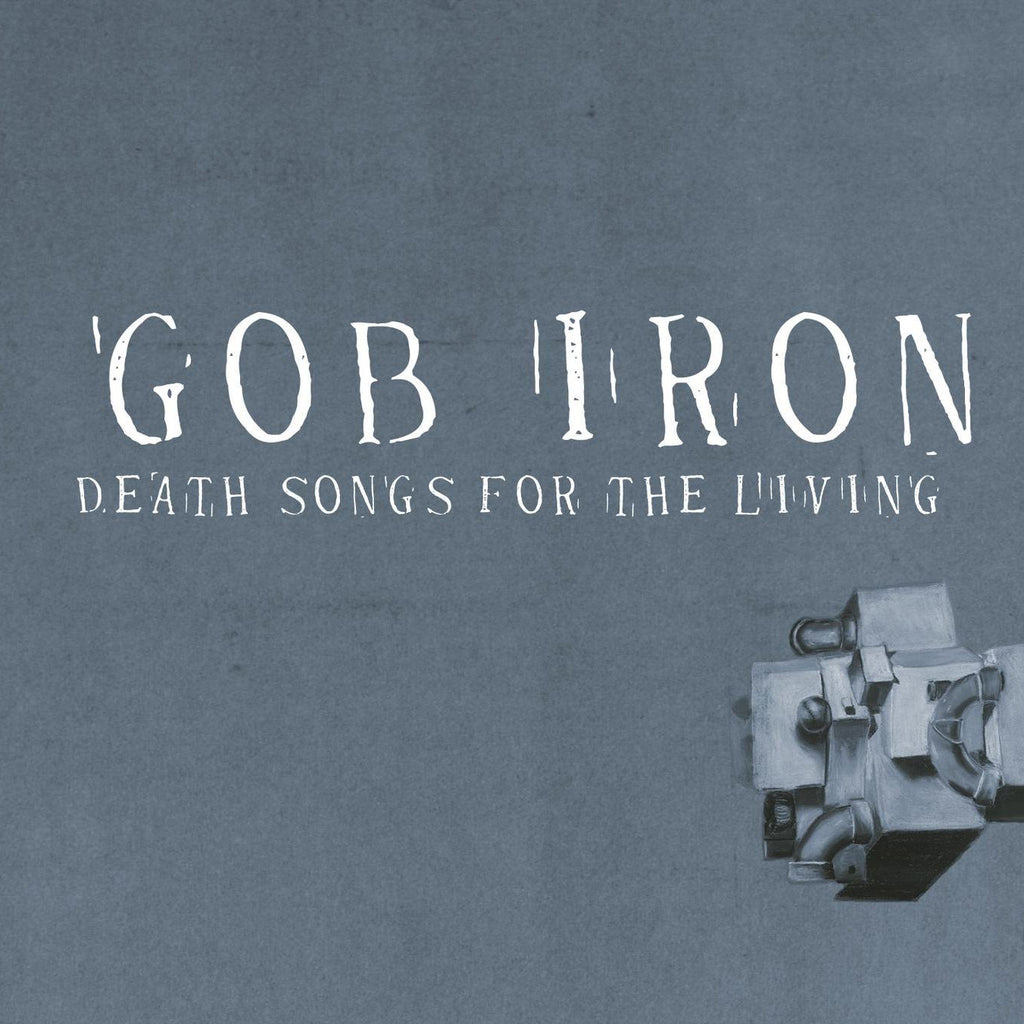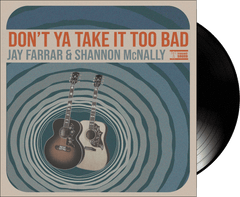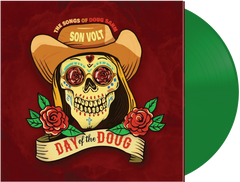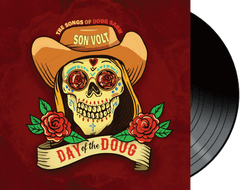
GOB IRON - Death Songs For The Living DIGITAL DOWNLOAD
$ 10.00
1. Death's Black Train Is Coming
2. Instrumental #1
3. Hard Times
4. Instrumental #2
5. Hills Of Mexico
6. Instrumental #3
7. Silicosis Blues
8. Instrumental #4
9. Wayside Tavern
10. Instrumental #5
11. Nicotine Blues
12. Instrumental #6
13. Death Is Only A Dream
14. Instrumental #7
15. East Virginia Blues
16. Instrumental #8
17. Little Girl And Dreadful Snake
18. Instrumental #9
19. Buzz & Grind
JAY FARRAR: Vocals, acoustic and electric guitars, bass, lap steel, piano, pump organ, dulcimer, harmonica
ANDERS PARKER: Vocals, acoustic and electric guitars, e-bow, piano, bass, drums
Some classic recordings are premeditated, but in certain rare instances, when an artist has something else entirely in mind, art barges through the studio door and takes over, bending the artist to its will. That’s what happened to Son Volt/Uncle Tupelo auteur Jay Farrar and his friend, Varnaline founder Anders Parker, who met up at Farrar’s St. Louis studio in the autumn of 2004 with the intention of recording a Son Volt album, with multi-instrumentalist Anders Parker sitting in. Although that project got postponed, another one willed its way into existence in the space of five days, and was thoughtfully captured on two-inch tape by the principals. “It turned into something neither of us anticipated,” Parker readily acknowledges.
This spontaneously created but strikingly coherent album, which bears the upbeat title Death Songs for the Living (released Oct. 31 on Transmit Sound/Legacy Recordings), stands as a real-time landmark from these two musical and spiritual kinsmen, who have retroactively adopted the moniker Gob Iron (that’s British slang for a harmonica), for reasons of their own.
The nine reconfigured folk songs and one original Farrar and Parker chose, arranged and performed on the fly during those fruitful impromptu sessions serve as a mesmerizing demonstration of the sustained creative reverie that can take place when two utterly attuned artists come together and simply allow themselves to be pulled along by their taste and instincts. Death Songs for the Living consists of a series of very different takes on these American folk standards, intercut with instrumental miniatures – Farrar refers to them as “extemporaneous jams” – which serve as subtle yet taut connecting threads.
“I’ve always considered folk music a fundamental form that I was due to revisit after the one Uncle Tupelo record, March 16-20,” says Farrar. “As for the title of the record, Anders and I just decided to pick some songs, and only later did we realize that most of them were about death. Maybe death-related songs resonate most, because absolutely everyone has to deal with it.”
Employing what Pete Seeger once dubbed “the folk process,” Farrar and Parker have reimagined songs by the likes of Stephen Foster, the Stanley Brothers, the Rev. JM Gates and others, interpolating elements of other traditional pieces as well as writing new, sometimes highly personal lyrics, so that the results sound both ancient and immediate, bringing a new layer of authenticity to the material. It was as if the very atmosphere of America was filling the lungs of the two artists as they sang.
Says Parker: “The folk music I’m most interested in is the kind that has super-rough edges and is, for lack of a better term, fucked up – in the presentation, the lyrical content or whatever. I really like Pete Seeger, but I came to him later, because I was drawn to the darker, wilder-sounding stuff. And somehow, Jay and I ended up in that same wheelhouse on this record.”
THE SONGS: “Death’s Black Train”: This song by the Rev. JM Gates can be found on the Legacy box set Roots and Blues; Farrar was attracted to its ethereal quality and the style in which it was originally presented. Although it belongs to a very different time and place, “the bedrock themes of sin and salvation” (as Farrar puts it) found in Gates’ songs make them especially resonant today.
“Hard Times”: Farrar learned this song from his folksinging father, who was a Stephen Foster fan. “I just liked the sentiment in the title,” says Farrar. “I heard it as a kid and I’ve heard people cover it over the years, but I don’t have it on record or CD. So I was just pulling elements I remembered and then making up new lyrics and a melody for it.”
“Hills of Mexico”: Parker heard an aborted version of this song (also known as “Buffalo Skinners”) on the Dylan & the Band five-CD bootleg, Genuine Basement Tapes. His take of their take. Cowboy's get cheated out of fair wage, boss left dead in desert.
“Silicosis Blues”: In a brand-new example of the above-mentioned folk process, Farrar brought together the melody of “Paul and Silas in Jail” (another find from the Roots and Blues box set) and the lyric of the miners’ lament “Silicosis Blues,” which he came across on a blues compilation, topping off this roots mash-up with a newly penned additional verse.
“Wayside Tavern”: This song, “Death Is Only a Dream” and “The Little Girl and the Dreadful Snake” were all cut by the Stanley Brothers during their first recording sessions, documented on The Complete Rich-R-Tone 78s (1947-1952). “There’s something so dark and yearning about all of these tunes that drew me in,” says Parker, who chose them. “In ‘Wayside Tavern,’ I changed the lyric so that the character who was singing was murdered by the scorned boyfriend. The death of the girlfriend/barmaid is left in question. It’s an age-old story that continues to this day—read the newspaper for proof.” In this adaptation, Parker says he was going for “a mid-period Richard & Linda Thompson feel.”
“Nicotine Blues”: Here, Farrar wrote highly personal new lyrics to the tune of Clarence Ashley’s “Coo Coo Bird.” “I was not much of a smoker, but I’ve seen the effects of it,” he points out. “My father and several of my uncles were heavy smokers, and they all died of lung cancer. So it’s something I was confronted by through personal experience, and I felt like acknowledging it.”
“Death Is Only a Dream”: Parker slowed down this Stanley Brothers song and reworked it around his piano, emphasizing the dreamy feeling of the choruses.
“East Virginia Blues”: Farrar learned this traditional song off a Ramblin’ Jack Elliot record. “It was one song of his that always appealed to me, so we gave it a shot,” he says, with characteristic succinctness.
“Little Girl and Dreadful Snake”: Of his third Stanley Brothers selection, Parker quips, “It’s apocryphal, perhaps, but be careful in the woods.”
“Buzz and Grind”: The album goes out on a visceral note with this rocking Farrar original, which finds Parker banging away on the drum kit. It’s another spontaneous move by the principals, whose instincts once again prove to be impeccable. “I was listening to a lot of R. L. Burnside and thinking of doing a whole blues record,” notes Farrar. “This song is as far as I got. So I had it sitting around, and it seemed to fit the aesthetic, although it didn’t have death in it anywhere – but then, that wasn’t a fully realized concept when we recorded the songs.”
These death songs (and possibly “Buzz and Grind” as well) will come to life, so to speak, in November and December, when Farrar and Parker do a series of special performances. Coincidentally, Parker's third solo release, a self-titled LP (on Baryon Records), which he describes as “an acoustic band record,” also comes out on Oct. 31. Meanwhile, Farrar is working on a new Son Volt album.
Performed, recorded and mixed by JF and AP at The Hill, St Louis, MO.
“Buzz & Grind” engineered by Mike Martin, JF and AP. Mixed by John Agnello at Head Gear, Brooklyn, NY
Instrumentals mixed by Mike Martin and Mark Spencer
Mastered by Steve Fallone at Sterling Sound, NY, NY
(Transmit Sound 2019 - Distributed by Thirty Tigers)





Share this item: